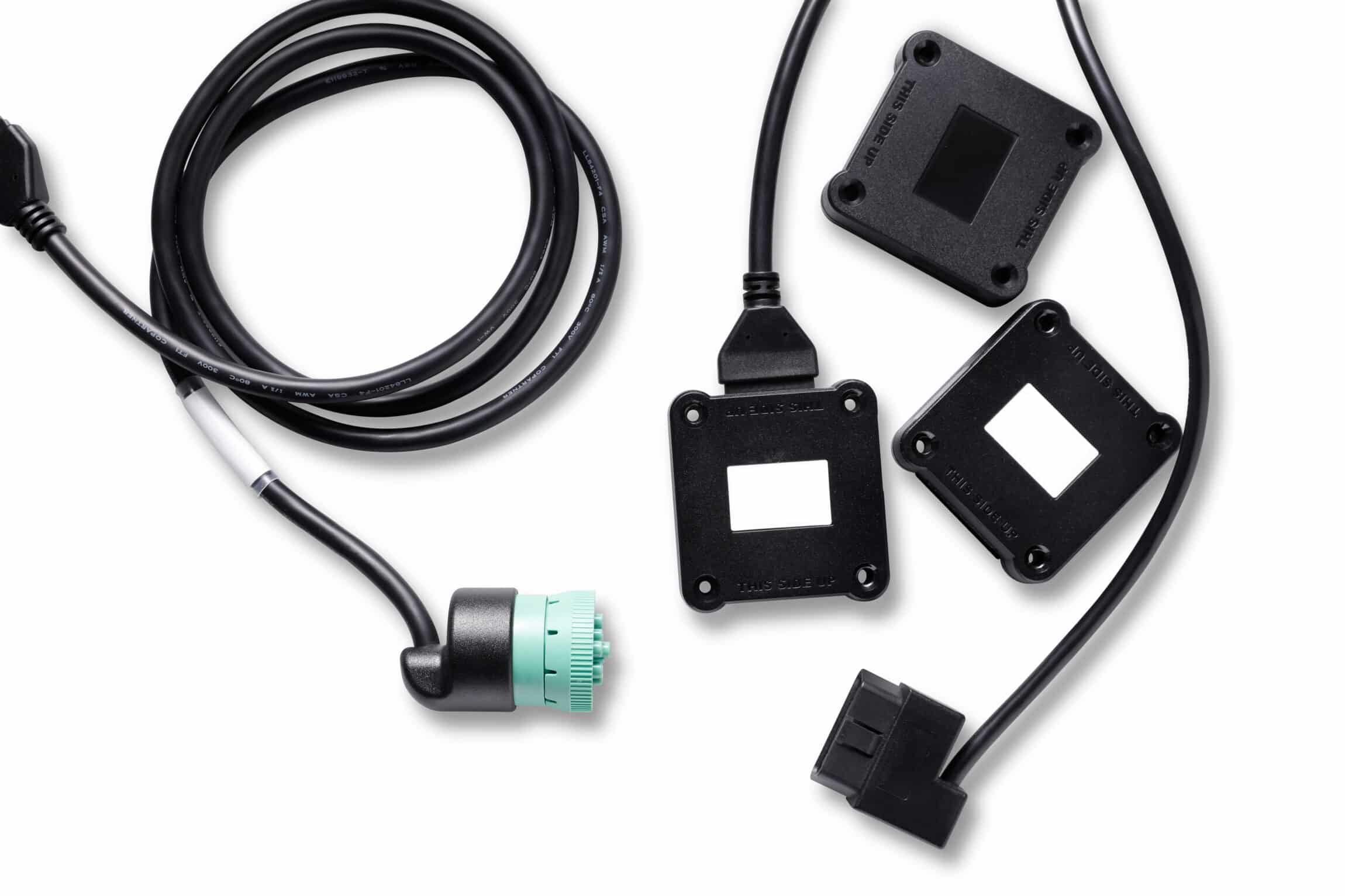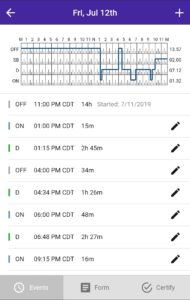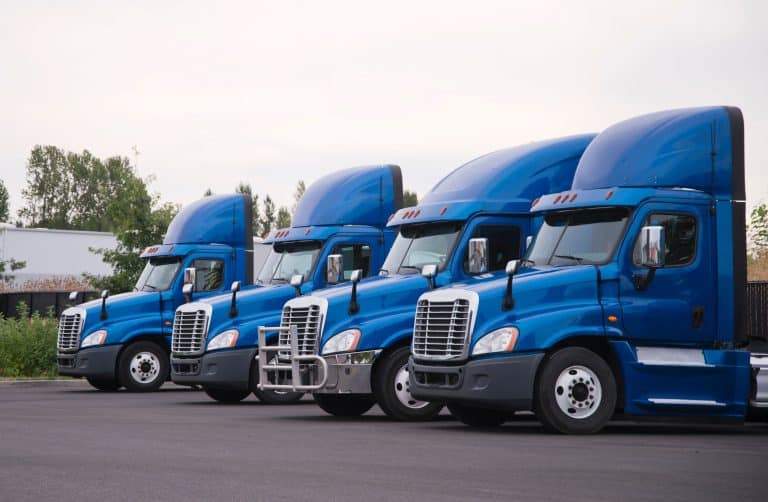Switch to a Reliable DOT Hours of Service Logbook for Enhanced Efficiency and Compliance
For decades, hours of service regulations have been enforced to ensure that commercial drivers maintain legal work hours. Now, due to the ELD mandate, commercial motor vehicle drivers are required to maintain accurate records of their driving time and breaks using a DOT hours of service logbook device. HOS rules are applicable to all commercial drivers who operate trucks, buses, and certain types of vans involved in interstate commerce and meet specific criteria.
Commercial motor vehicle drivers who operate vehicles weighing 10,001 pounds or more, vehicles designed to transport 16 or more passengers, or vehicles carrying hazardous materials are required to follow HOS regulations. This article will provide a closer look at DOT logbook regulations, examine red flags of unreliable ELD providers, and provide an excellent option to increase your business compliance and profitability.
Do you have any questions? Talk to ELD Advisor: 650-405-3372 or Request Callback
ELD or Paper Logs: DOT Logbook Rules Explained
The deadline for compliance with the DOT electronic logbook law, also known as the ELD mandate, in the US was December 16, 2019. Since then, commercial motor vehicle drivers who are subject to DOT logbook rules have been required to use an electronic logbook that meets the technical specifications set forth by the Federal Motor Carrier Safety Administration. To comply with the law, operators must record their hours of service using an FMCSA-approved elog device that connects directly to the vehicle’s engine. As previously mentioned, HOS rules apply to certain types of drivers and vehicles engaged in interstate commerce and meeting weight or passenger criteria. However, there are some exceptions to the mandate that allow operators to use paper logs or time cards instead of recording this information electronically. These exceptions include:
- Short-haul drivers who operate within a 150 air-mile radius from their work location. They are allowed to use time cards instead of RODS and are thus exempted from using ELDs.
- Drivers who keep paper RODS for a maximum of eight days in a thirty-day cycle.
- Drivers who deliver commodities through drive-away-tow-away operations.
- Drivers operating vehicles with engines manufactured before 2000.
While there are exceptions to the ELD mandate, operators must still comply with DOT logbook rules by accurately recording their hours of service. Failure to comply can result in fines and penalties for both the driver and the carrier which is why it is vital to choose an efficient solution included in the FMCSA’s approved list. In the next section, we will examine problems that motor carriers can face when using an unreliable ELD.

Red Flags of DOT Hours of Service Logbooks
Choosing the right DOT hours of service logbook is critical to maintain compliance with regulations and avoid violations and penalties. In this section we talk about some common issues of electronic logbooks. If you are experiencing any of these issues, it might be time to consider switching providers:
- Inefficient customer support. One of the most critical factors to consider when choosing an electronic logging system is the level of customer support offered. If a driver experiences a problem with their logbook and cannot reach support to solve it quickly, it can result in delays, missed deadlines, and potential violations. A logbook system provider with a responsive and helpful support team can make all the difference in keeping a carrier’s operations running smoothly. If your provider leaves you on hold for too long or it is hard for you to get a hold of someone knowledgeable, you might benefit from a logbook with better post-sale services.
- Overly complex system. Solutions with a hard-to-navigate interface can significantly slow down drivers’ workflows, reducing efficiency and increasing the risk of errors. A reliable DOT hours of service logbook should have an intuitive interface that allows drivers to quickly find their remaining drive time, access and manage previous logs, and check for specific HOS and DVIR violations, amongst other features. If a logbook solution requires a lot of time to complete these simple tasks, it may not be the best fit for your trucking business.
- Drivers are not satisfied with the solution. The key to selecting the right logbook system is considering the driver’s needs and preferences since they will be using it daily. A complex and difficult-to-use ELD can lead to errors or skipped logging, ultimately resulting in compliance issues. To prevent this, it is crucial to choose a provider that offers a trial version so drivers can test it and ensure they are comfortable with the system.
- Hidden fees. A lack of transparency in pricing can lead to unexpected costs that strain carriers’ budgets and impact their profitability. Make sure you understand the total cost of the logbook solution, including any add-ons for concepts like activation or installation. Look for a logbook provider that offers straightforward, transparent pricing and does not surprise you with unexpected charges.
By keeping these red flags in mind and choosing a logbook solution that prioritizes customer support, user-friendliness, and transparent pricing, motor carriers can minimize the risk of compliance issues and costly violations. In the next section, we will introduce a top-rated DOT hours of service logbook for truckers.
HOS247 Is a Trusted ELD Provider for Your Business
HOS247 is a leading ELD service provider that prioritizes customer satisfaction and compliance with applicable regulations. Our solution is appreciated by truckers for its user-friendly interface, efficient data transfer, and efficient technical support. Independent user reviews frequently mention the quality of our customer support, stable data recollection, and reliable service. Let’s examine the characteristics that make the HOS247 system so effective and popular among truckers:
- Excellent customer support. HOS247’s customer support is available seven days a week. Our tech managers are highly skilled and knowledgeable, providing expert assistance to help drivers and managers navigate any issues that may arise with their ELD system, including implementation, troubleshooting, and questions about compliance. In addition, our multilingual team speaks English, Spanish, Polish, and Russian to effectively assist a broader range of customers. HOS247 also has a callback policy that ensures customers receive a prompt response to their inquiries: if your call drops, we will contact you back immediately.

- User-friendly interface. As briefly mentioned earlier, HOS247’s DOT hours of service logbook’s easy-to-use interface is one of the reasons truckers choose our system. The straightforward app minimizes the risk of HOS violations, ensuring drivers can focus on the road and easily maintain compliance. Additionally, the intuitive web-based portal provides fleet managers with access to valuable vehicle metrics and all drivers’ records of duty status. This helps fleet managers improve operational productivity by streamlining workflows, reducing administrative tasks, and providing insights into fleet performance.
- No contracts. We take pride in offering clients the flexibility to choose the subscription plan that best fits their business needs without committing to lengthy contracts. Unlike other ELD service providers, HOS247 offers a no-contract policy that allows customers to choose between monthly or yearly subscription plans that can be changed or canceled without any hassle.
- Two-week trial. We understand the importance of making an informed decision when it comes to choosing the right ELD for your business. That’s why we offer a refundable 14-day trial for customers who want to test the performance of the HOS247 electronic logbook and find out if it meets their needs. During this two-week period, customers can get to know the system and receive a full refund if they decide to return the device.
- Tools to enhance performance. With HOS247, clients get access to an all-in-one fleet management system that not only helps them stay compliant but also improves overall performance. Real-time GPS tracking, idle reporting, vehicle maintenance reminders, vehicle diagnostics, and IFTA mileage calculations can be integrated with the ELD to reduce administrative paperwork, cut operational costs, and improve vehicle security.
Do you have any questions? Talk to ELD Advisor: 650-405-3372 or Request Callback
Are You Using an Approved ELD?

It is important for carriers and drivers to make sure that their electronic logging device is registered with the FMCSA. DOT hours of service logbooks have to undergo a self-certification process to prove they meet the requirements set by the Federal Motor Carrier Safety Administration. To verify your ELD is approved, check the list of approved ELD providers on the FMCSA’s website. It is also advisable to sign up for ELD updates to stay informed. When an ELD is removed from the registration list due to noncompliance issues, the Authority gives carriers eight days to replace it with an approved system. Remember, the responsibility to use a registered device lies with the carrier.
HOS247 is a registered ELD provider that prioritizes compliance with all hours of service regulations set forth by the FMCSA. Our solution has been extensively tested to provide carriers with a reliable service to record HOS data in real-time and an easily manageable system for drivers.

As an expert in B2B and B2C sales, I’ve dedicated myself to perfecting sales processes and client retention strategies in the logistics and trucking industry. I have significantly contributed to the expansion of the ELD service, catering to retail and wholesale clients in need of HOS247 ELD solutions. My unwavering commitment to implementing state-of-the-art sales techniques and technologies ensures the continuous growth and success of businesses I work with.












A good fleet management software is going to be essential to any fleet moving forward into the future. It helps their businesses to run efficiently, keeps employees happy, and makes it easier for them to remain DOT compliant. However, very

GPS tracking has become a valuable tool for truckers looking to protect their assets and maximize profits. Its ability to provide real-time location and other critical information is transforming how fleets are managed. From bolstering efficiency to enhancing security and

GPS tracking is an indispensable tool for fleet businesses as it provides managers with information about the real-time location of vehicles and other assets, helping motor carriers effectively monitor their fleets and optimize processes. USA truck tracking uses Global Positioning